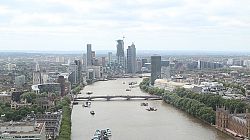

The Clean Air (Human Rights) Bill has passed the Committee Stage in the House of Lords unopposed.
If it becomes an Act of Parliament, it will enshrine the right to clean air in law.
Main aims of the Bill
The Bill aims to:
Ella's Law
The Private Member's Bill began its journey earlier in the year, and was put forward by the Green Party's Baroness Jenny Jones.
It treats pollution as matter of social justice and is known as "Ella's Law", as a tribute to nine-year-old Ella Roberta Adoo Kissi-Debrah who died from asthma induced by air pollution.
On 15 February 2013, Ella died from acute respiratory failure, severe asthma and air pollution exposure. She was the first person to have air pollution identified as a medical cause of death on her death certificate.
Modernisation of clean air legislation
It is now 70 years after the Great Smog of 1952 - a week long event in London that killed 4,000 people. A death rate greater than the Victorian cholera outbreaks.
The UK's first Clean Air Act was developed as a result, legislation which also started life as a Private member's Bill, introduced by Tory MP Gerald Nabarro. Now replaced by the Clean Air Act 1993, the legislation is in desperate need of being updated to take account of modern fuels, technologies and circumstances to protect people and the planet.
Baroness Jones' argues her Bill makes such improvements overnight, and there have been several significant international developments since the Second Reading on 8 July 2022.
On 28 July 2022, the United Nations General Assembly adopted a resolution recognising the right to a clean, healthy and sustainable environment as a human right and called on countries to scale up their efforts to meet this. 161 countries voted in favour of this resolution, including the UK and none voted against.
This resolution follows the World Health Organisation (WHO) tightening its air quality guidelines in September 2021 and the Glasgow Climate Pact in December 2021.
In addition, the EU Commission published its proposals in October 2022 for the revision of EU ambient Air Quality Directives after more than four years of consultations and discussions. Legislation that takes into account the WHO guidelines.
Comment from Baroness Jones
When the Bill was launched, Baroness Jones commented:
"Having a nice environment isn't just a matter of ecology and science, it is a question of social justice. The Clean Air (Human Rights) Bill would enshrine the human right to healthy air precisely and explicitly in UK law. A suitable date for the Government to put it into law would be before the 70th anniversary of the Great Smog later this year".
More recently, speaking in the House of Lords at the Committee Stage of the Bill, she provided an update:
"My Bill takes this [United Nations] resolution into something meaningful. This Bill is very timely and is being presented at the right place at the right time".
What happens next?
The next stages for the Bill in the House of Lords are the Report Stage on 28 November 2022 and the 3rd Reading on 2 December 2022.
Following those, it will be passed to the House of Commons for Debate.